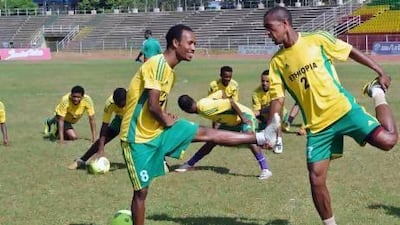In the Italian town of Tivoli, north-east of Rome, the outcome of today's meeting at the African Cup of Nations between Zambia and Ethiopia will be followed with as much passion and interest as it is in Addis Ababa.
Luciano Vassallo, now 77, lives in retirement there, frailer than when his dominant inside-forward play had him dubbed the "African Di Stefano", but still a sharp curator of some of the most glorious memories in the sporting history of one of Africa's biggest nations.
Ethiopia have qualified for an Afcon for the first time in 31 years, enough of a gap that the rest of the world can be forgiven for assuming this must be a nation where long-distance running trumps the 11-man game for popularity.
Not so. The time was that Ethiopia swaggered on the African stage. Granted, as founder members of the African Football Confederation in the late 1950s, before independence from colonialism for a majority of states, they occupied a less competitive field.
By 1962, when Vassallo captained his country at the third Nations Cup in Ethiopia, they were a team to be reckoned with. Vassallo and his brother Italo, a striker, had grown up as children of colonialism, the sons of an Italian soldier who came to East Africa as part of the Benito Mussolini-led annexation of what was then Abyssinia.
He married a local woman. The boys grew up with tales of Italian World Cup triumphs, and vivid back garden games. Luciano had a deceptively pigeon-toed running style, but a deft control of the ball.
After a 4-2 victory over the defending champions, Egypt in the 1962 Nations Cup final, Vassallo received the trophy from Emperor Haile Selassie.
"We had a great team," recalls Luciano Vassallo, "and a brilliant centre-forward called Menghistu Worku. It was the best Ethiopian team of all time."
That is hardly disputed, even half a century later. The country's political troubles through the 1970s and 1980s - a brutal civil war that led to the independence of Eritrea, from where the Vassallos hailed; devastating droughts; oppressive regimes - impacted on the sport, and, in common with much of East Africa, the national team became marginal in the African hierarchy.
Vassallo was among many who left the country, setting up a coaching school while working as a mechanic in Italy. He felt a certain sympathy when, in the mid-1990s, several members of the Ethiopian national squad, in transit in Rome between fixtures, suddenly sought political asylum in Italy.
The current picture, socially and on the field, is happier. Qualification for the Afcon was achieved last October with a dramatic win on away goals in the play-off against Sudan.
There is confidence striker Saladin Said has a potency to surprise the likes of the defending champions Zambia, and Nigeria - the two favourites to go through from Group C - although nobody is quite ready yet to label Said the new African Di Stefano, or the Messi of the Horn of Africa.
Follow us


